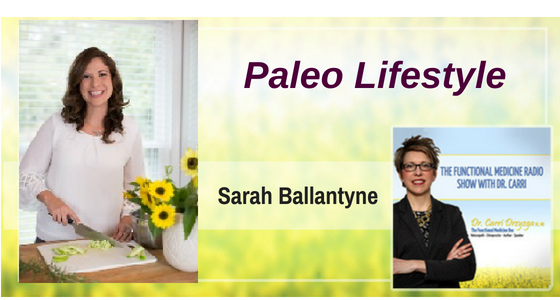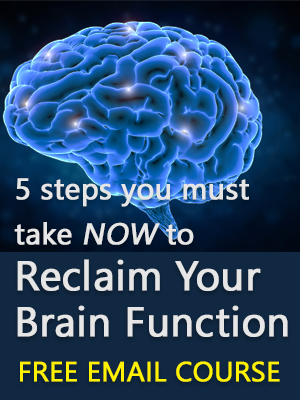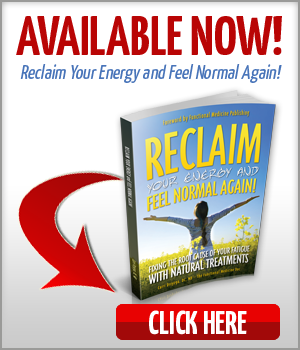Podcast: Play in new window | Download
Subscribe: Apple Podcasts | Android | RSS
In this episode of The Functional Medicine Radio Show, Dr. Carri’s special guest Sarah Ballantyne explains the Paleo lifestyle.
Sarah Ballantyne, Ph.D. is the blogger behind the award-winning www.ThePaleoMom.com; co-host of the syndicated top-rated The Paleo View Podcast; and New York Times bestselling author of The Paleo Approach, The Paleo Approach Cookbook, and The Healing Kitchen. Sarah earned her doctorate degree in medical biophysics at the age of 26. She spent the next four years doing research on innate immunity and inflammation. After her second daughter was born, she began to experiment with the Paleo lifestyle. It had an amazing effect on her health! Over time, she healed herself of a long laundry list of physical complaints including: Hashimoto’s thyroiditis, fibromyalgia, Irritable Bowel Syndrome, acid reflux, migraines, anxiety, asthma, allergies, eczema, psoriasis and an autoimmune skin condition called lichen planus. Her passion for providing straightforward explanations of the science behind the paleo diet and its modifications, plus her love of food and cooking and her dedication to her family form the foundations of her blog, her podcast and her books.
Main Questions Asked about the Paleo Lifestyle:
- Why doesn’t diet dogma and rules work?
- Can you talk a little bit about self-experimentation and bio-individuality?
- Which foods are in the gray zone that may or may not be creating an issue with somebody’s health?
- Could someone react to the skin or seeds of a vegetable? Could it get that detailed?
Key Points made by Sarah about the Paleo Lifestyle:
- As I was writing Paleo Principles, I was really trying to get away from a lot of the sound bite descriptions of the Paleo Diet and trying to create a resource that would give people the information about the Paleo lifestyle that they need to respond to criticisms of the diet. I also talk about some things that have traditionally been considered Paleo that maybe don’t work for a lot of people, and some foods that have traditionally been verboten, but actually do work for a lot of people.
- I did a bit of research into just the psychology of rules and rule following. There are some really interesting studies that have been done in the diet sphere.
- We sort of know no matter what sort of niche within the alternative health community you belong to, we all know that getting away from these super refined, highly processed very, very addictive manufactured foods is the number one thing that most people can do to improve their health.
- I think that getting away from dietary dogma also embraces imperfection, Paleo lifestyle not diet. It means that more of us will make the better choice more often.
- We know that there’s been genetic adaptation to agriculture. In the last five to 10,000 years, human diet has changed dramatically.
- We’ve got these foods that we universally know are a health promoting food. So, the most nutrient dense foods on the planet – that doesn’t mean you can’t develop an allergy or sensitivity to those foods.
- The way that we really determine if a food is working for us is by cutting it out for two to four weeks. That provides time for the body to down-regulate any adaptive mechanisms.
- Elimination challenge doesn’t create food sensitivities or food reactions rather it unmasks them. It allows us to see something that was happening all the time before.
- There are other things that influence how our bodies respond to food. For example, our stress level can make a really, really big difference to how our bodies respond to food. It can ramp up the immune system in sort of a dysfunctional way. So, stress is inflammatory. Stress also negatively impacts gut barrier integrity. Over-training, inadequate sleep, and nutrient deficiencies also do something similar.
- What’s interesting about these other individual factors is that they are a moving target. They change.
- Vegetables of the nightshade family are typically considered Paleo but actually don’t work for a lot of people.
- Tomatoes have these very, very inflammatory compounds wrapped up in this quite nutritious little package and it’s no wonder that tomatoes were considered a toxic food until a few hundred years ago. Women at that time would be accused of being witches if they cooked with tomatoes.
- A lot of the issues with dairy really only apply to homogenized conventional dairy products.
- This is why I really feel that we can’t simplify dietary frameworks to a one size fits all eat this, don’t eat this. Instead, we really need to give people this broader education, and the tools to figure this out. I really don’t want it to be intimidating. I want it to be empowering for people.
- I try to encourage people to think of the Paleo lifestyle as a fun discovery process because it does take a long time to do this systematically but then what you have at the end of it is really detailed knowledge about how your body reacts to certain foods.
Resources Mentioned for the Paleo Lifestyle:
Podcast Interview – Going Paleo: The Diet We’re Meant to Eat? with Sarah Ballantyne
Podcast Interview – The Autoimmune Paleo Diet with Dr. Sarah Ballantyne
Book – The Paleo Approach: Reverse Autoimmune Disease and Heal Your Body
Book – The Paleo Approach Cookbook: A Detailed Guide to Heal Your Body and Nourish Your Soul
Book – The Healing Kitchen: 175+ Quick & Easy Paleo Recipes to Help You Thrive
Book – Reclaim Your Energy and Feel Normal Again
Thank you for listening! If you enjoyed this podcast, please subscribe and leave a 5-star rating and review on iTunes!




